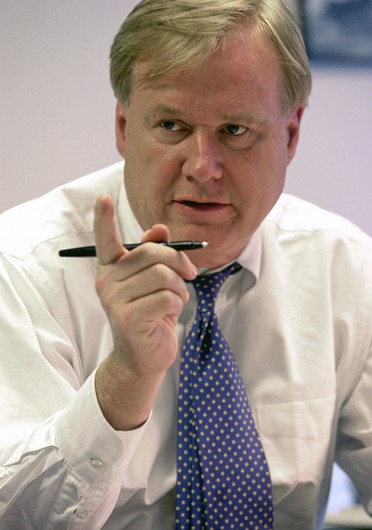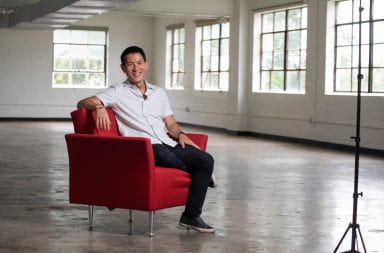
Chris Matthews, host of MSNBC political talk show “Hardball with Chris Matthews,” was announced as OSU’s Spring 2014 commencement speaker March 21.
Credit: Courtesy of MCT
After no students were involved in the most recent commencement speaker selection, a new committee has been created to select the lineup for the 2014-15 academic year.
Ohio State Provost and Executive Vice President Joseph Steinmetz said the committee will include three students.
The spring speaker, Chris Matthews of MSNBC’s “Hardball with Chris Matthews,” was selected by Steinmetz and others in the Office of Academic Affairs — a list he said included “all the vice provosts and all the vice presidents.”
Steinmetz said the choice was made without the traditional use of the selection committee because the university is in a transition period as it prepares for newly appointed president Dr. Michael Drake to take over in June.
“It turns out in so much transition that was going on, the selection of a speaker came rather later than normal,” he said in a Tuesday interview with The Lantern. “To get a prominent national figure to campus, you must have a nine to 10 month minimum lead time to make the arrangements, to make sure the schedule’s open, etc., for somebody … we (were) down to five months (when we started looking). It (was) a pretty quick timeline.”
Interim President Joseph Alutto said students should be involved and the committee should be more structured, so there won’t be a lapse again in the process.
“We need to have a process where there’s student involvement and we have had one and I think we will be continuing to have that involvement,” Alutto said in an interview with The Lantern Monday. “That’s what we need to reinstall, which is a committee that stays active throughout the year and doesn’t get sidetracked when there are other changes that affect the institution, because graduation is going to occur every year. They’re going to occur multiple times every year.”
The committee for future years is set to include multiple students — one selected by the Undergraduate Student Government, one selected by the Council of Graduate Students and one selected by the Inter-Professional Council.
There are also set to be six faculty members — including the new addition of a faculty member from the Honorary Degree Committee — and four staff members, representing the Office of Student Life and the advancement, government affairs and special events and commencement committees.
Steinmetz said it was important to have someone who represents the Honorary Degree Committee involved with the speaker selection process because he wants people who receive honorary degrees to interact more with the university a few days before commencement.
“This was a connection that was never made very much in the past even though we give honorary degrees to our commencement speakers,” he said. “We don’t engage the people that come and get honorary degrees enough. So we’ve set aside funds to bring those people onto campus earlier to teach classes and to interact with the students and faculty, so we want that connection to make sure that happens when we select the commencement speaker.”
Niraj Antani, a 2013 OSU alumnus who was on the commencement speaker selection committee last year when U.S. President Barack Obama was chosen to speak at the 2013 Spring Commencement, said he was happy to hear a committee would be back for future commencements.
“(The new committee) seems similar enough (to the previous one),” he said. “It’s probably a good idea to have the honorary degree person on there.”
He added that having someone from government affairs was an interesting choice.
“It’s good to have someone from government affairs on there, even though it was my opinion that students were tired of having politicians as their commencement speaker and they almost want more entertainers on there,” Antani said.
Steinmetz said the committee will be run and managed by the Office of Academic Affairs rather than the Office of Communication and the Board of Trustees’ office as in past years.
The committee is charged with finding “a good public speaker in a position to deliver a meaningful message with relevance for our graduating students” for the winter, spring and summer graduations, according to a document outlining the committee provided by Steinmetz.
The speaker should also have “name recognition” — something specifically stated as important for the May commencement ceremony.
When looking for a speaker without the help of a committee, Steinmetz said he wanted the life experiences that come with name recognition.
“As a selection of an individual … particularly for the spring commencement which is our largest one, you want somebody visible. You want somebody that has life experiences, that can talk about those life experiences in a meaningful way,” Steinmetz said.
He added that he didn’t care what the speaker’s profession or ideas were as long as they could share their experiences.
“It doesn’t matter to me the line of life that somebody comes from. It can be politician, it can be somebody from the media, it can be somebody from industry and business, etc.,” he said. “It can be an alum, an artist, etc., and I think if you look over the commencements in the past, you’ll see that that’s been the pattern of selection.”
Former USG Vice President Josh Ahart said last week USG tried to reach out to the commencement speaker selection committee throughout the year but never received any responses.
“The vice president of USG gets to appoint (someone) to certain committees, so I did appoint someone to the commencement speaker selection committee, and they tried several times to get in contact with that committee chair,” said Ahart, a fourth-year in public affairs. “No emails were ever responded to, no emails were ever forwarded or responded to … I never heard anything all year.”
Some graduating seniors said they were happy to hear student input will be a part of the process again in the future.
“I would prefer more student input because I have heard some backlash from how politically oriented the speaker is,” said Renee Riedel, a fourth-year in marketing.
Ian Mulholland, a fourth-year in economics, agreed that student input would positively impact the process.
“It’s good … you can’t dwell on it too much. Chris Matthews is fine for me because at least I’ve heard his name,” he said.
Spring Commencement is set to take place May 4 at noon at Ohio Stadium, and about 10,000 students are expected to graduate.


